
Get Hired Into A Highly Paid Research Position At A Top Biotech, Tech, or Pharmaceutical Company
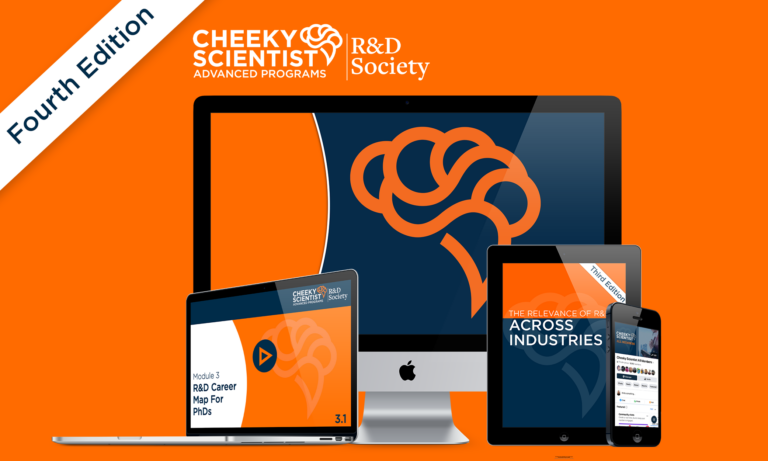
Introducing The Third Edition Of The R&D Career Track In The Cheeky Scientist Association Diamond Program
Take Action Now To Get Access To The R&D Society Program So You Can Get Hired In A Rewarding R&D Position. No Matter Your Background.
Here's What You Get Immediate Access To When You Join The R&D Society...
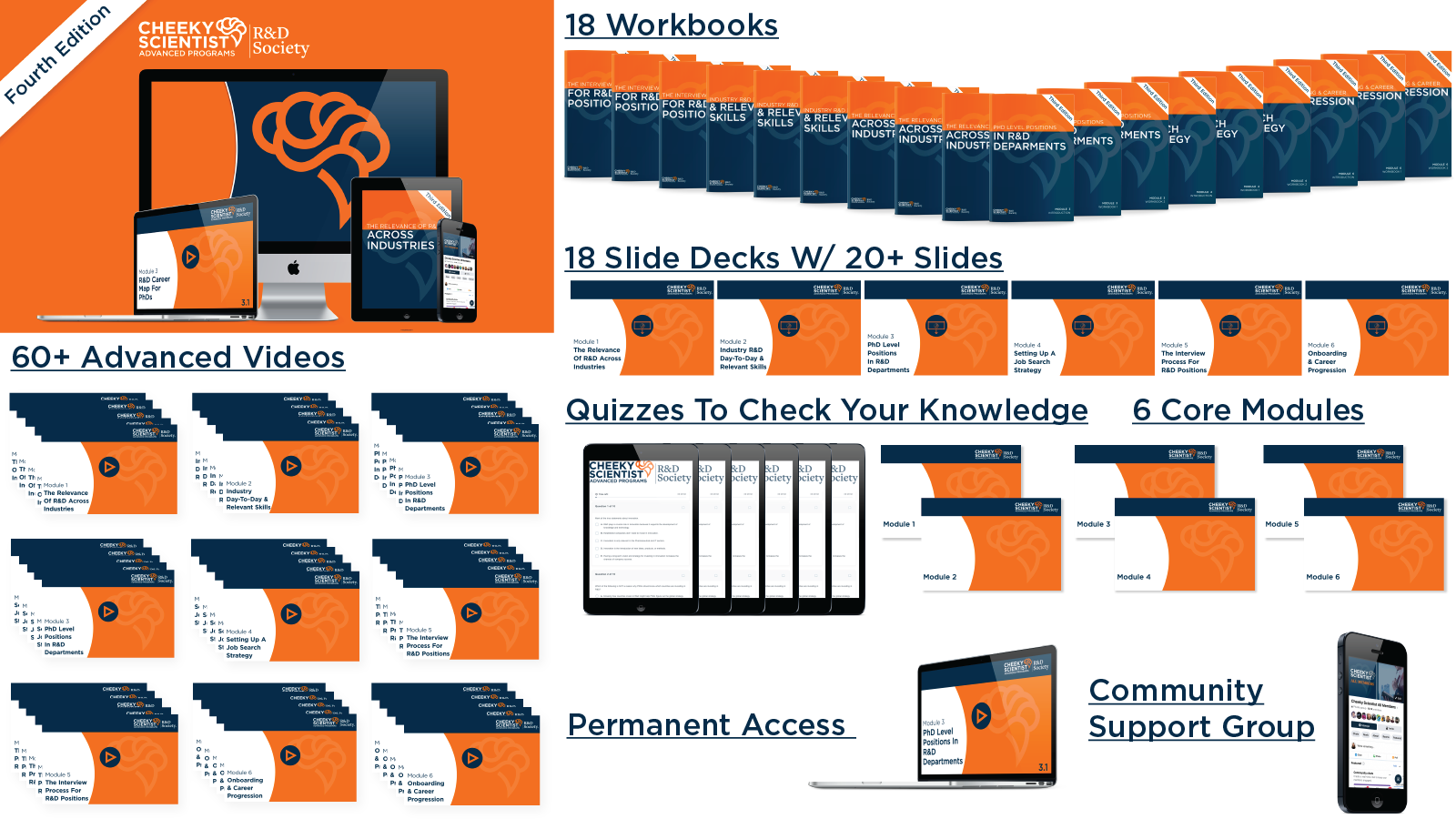
Gain Targeted And Personalized Guidance From R&D Professionals Who Will Help You Understand How To Get Into A Top R&D Role

“The variety of Research Scientists in the R&D Society means that members can gain insight into how to get hired into a breadth of R&D industries, including, tech, pharmaceutical, cosmetic, engineering, biotechnology, and more.”

“Learning first-hand from Research Scientists about job search techniques and what life was like outside of academia gave me a significant advantage over other job candidates.”
THE R&D SOCIETY EMPOWERS THOSE WHO WANT TO…
- Make the most natural transition from academic research to industry research.
- Use what they have learned during their training in higher education to innovate in different sectors.
- Gain clarity on the positions and opportunities available in the R&D departments of companies in diverse industries.
- Understand the R&D work environment and what a typical day would look like.
- Get targeted, structured, and personal guidance from current industry R&D professionals on securing a position.
- Cultivate the answers to tough interview questions that major R&D companies are asking now.
- Learn how to perform an effective industry presentation in front of corporate decision-makers during site visits.
If You’re Seeking An R&D Position, See If You Answer YES To These Questions…
Do you want a high-quality research position, but want to stay involved with innovative research – either at the bench or away from it?
Do you struggle translating your value into industry-relevant results beyond publications?
Have you found it challenging to get noticed by employers because there are so many people trying to leave academia for R&D now?
Do you have little information on what an R&D position would entail, making you wonder if you’re prepared for an interview…much less a new role?
Are you wondering how the skills you already have that you developed in academia translate into the skills you need to break into an R&D position?
PhDs Working In Industry Are Drivers Of Innovation
Innovation is the introduction of new ideas, products or methods, and it allows companies to penetrate new markets and access new opportunities.
R&D directly supports the development of knowledge and technology, both of which are crucial components of innovation. All companies need to innovate to stay relevant, and that is especially true during tough economic times like the current contracting economy.
As a skilled researcher, you have been trained on how to push the boundaries of knowledge and innovate within your field. Less than 2% of the global population has this kind of knowledge. This makes you an outstanding candidate for companies looking to innovate in an unpredictable market environment.
These companies will keep investing in R&D this year, even during the current market contraction.
During past economic downturns, 70% of companies invested in R&D despite decreased revenue, and executives credit this decision for their companies’ growth when the economy recovered (RVmagnetics).
Takeaways From Past Economic Downturns...
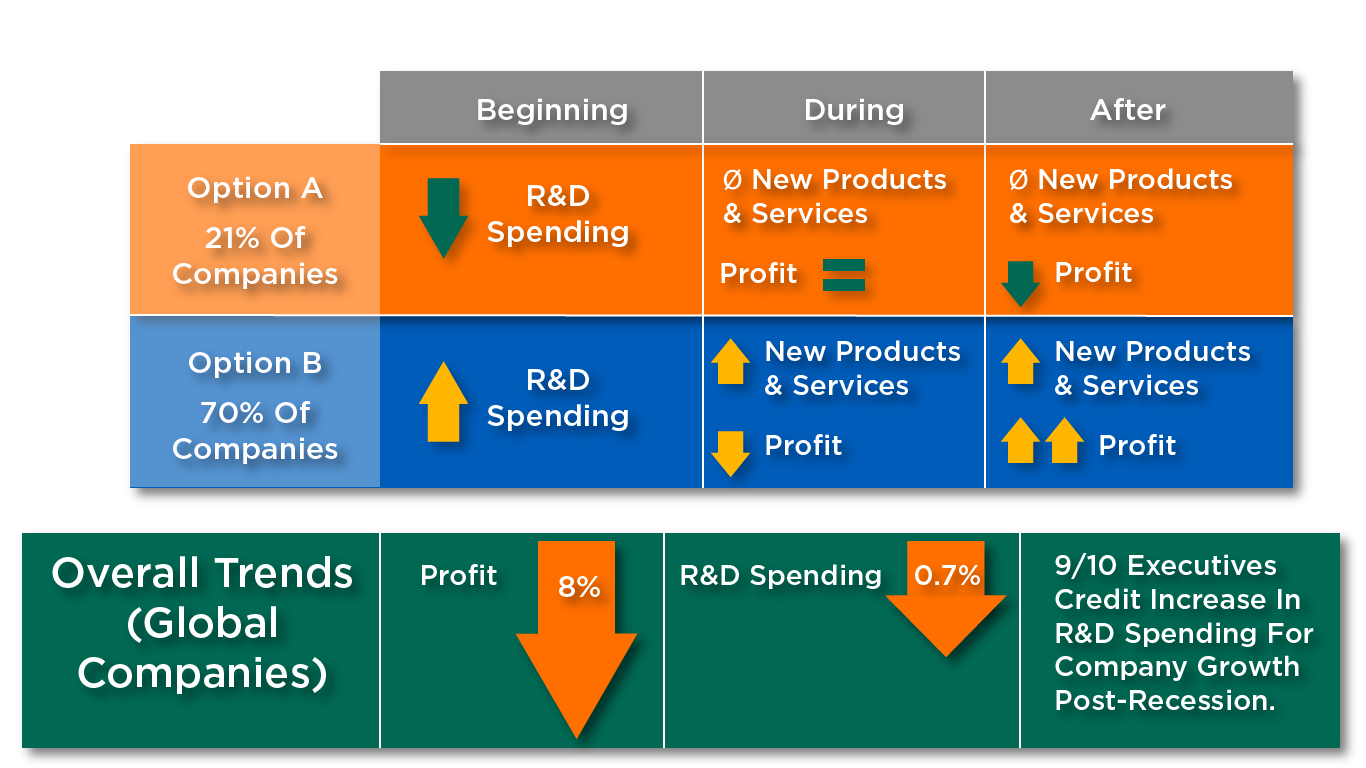
Imagine receiving targeted, structured, and personalized advice on how to get hired from current R&D professionals at top companies.
Imagine getting step-by-step insights on how you will be using your current skills in a top R&D position and how to get into the right position for you.
The R&D Society will give you access to a community of thousands of professionals who can answer questions that you have in real time and provide you with networking opportunities.
If you want to focus your job search on the right R&D companies for you, demystify what you can expect from an R&D position, and gain insights from industry R&D professionals, then the R&D Society is the perfect fit for you.
Whether You Have Postgraduate Experience Or Are About To Get Your Degree,
It Isn’t Too Early Or Too Late To Become An R&D Professional At A Top Company.
No matter where you are in your research career, the time to get hired and get paid what you’re worth is now
Don’t do more academic research.
Instead, transition NOW.
Don’t stay in academia out of a sense of guilt.
Instead, transition NOW.
Realize that top companies do NOT want you to gain more academic research experience before hiring you.
Instead, they want you to gain on-the-job experience.
That’s right – they want to give you company-specific, on-the-job training …and they would prefer this training to start NOW.
The Sooner You Get Hired, The More Successful Your Career Will Be.

“The R&D Society provides a more intimate setting that allowed me to learn from top R&D professionals and get community support from others going through the same job search process as me. The advice I received was high quality and from current corporate research scientists.”

“Receiving targeted feedback regarding research scientist interviews, presentations, and resumes from current industry research scientists gave me confidence and ensured I was approaching my R&D job search correctly.”
Here's The Targeted Guidance You'll Receive From The Third Edition Of The R&D Society...
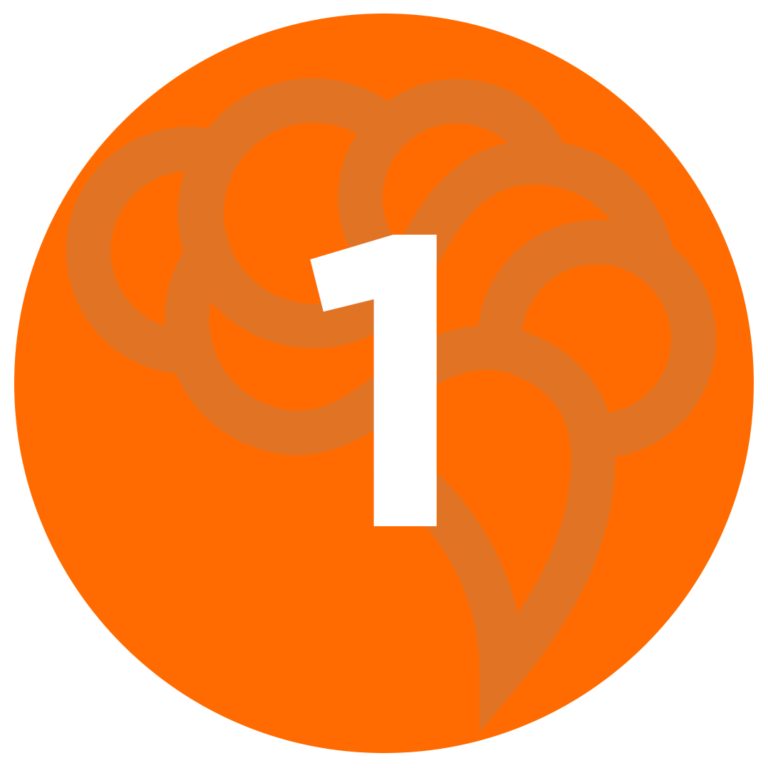
Module #1 Which R&D Sectors & Positions Are Right For You
You know you want to pursue a career in R&D but don’t know where to start or what are the options that the field has to offer. This module covers…
- The importance of R&D for innovation in different industries. By the end of this module, you will have a broad understanding of the R&D field and the role it plays in guaranteeing that companies in different industries can innovate and stay relevant in the market.
- Relevant trends in both research and development You might think that R&D is only relevant in the biotech, tech and pharmaceutical industries, but in reality, all enterprises – private companies, public companies, and even full countries – invest in both research and development. By the end of this module, you will be expert in the trends that are shaping R&D in the global economy.
- The different sectors that invest in R&D beyond biotech, tech and pharmaceuticals—from food and beverage to gaming. Understand the goals and interest of companies in each industry and why, for example, working in cosmetics or telecom might suit you best.
- What you need to know about global R&D investments.
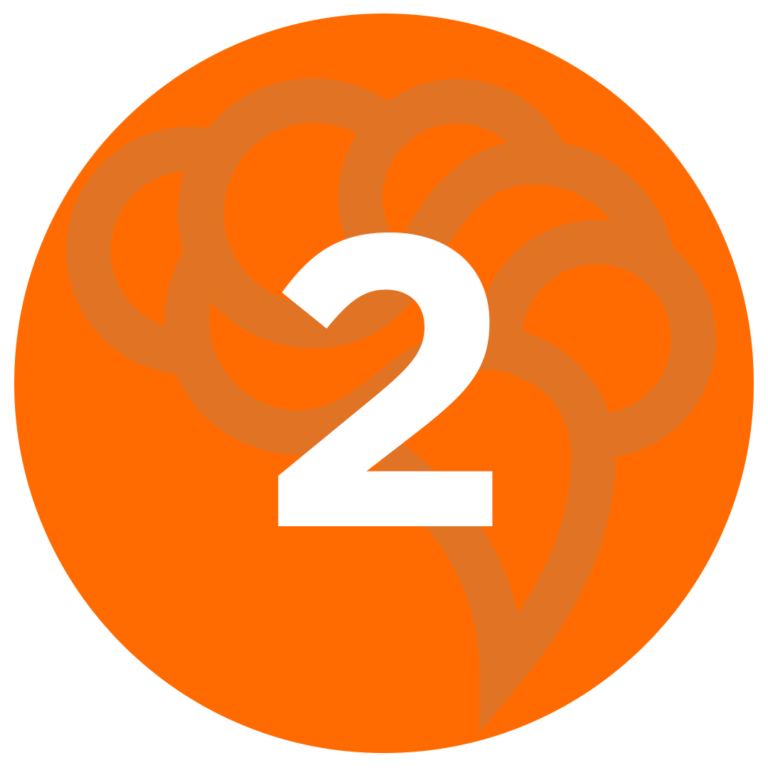
Module #2 How To Leverage Your Current Skills To Get Hired
If you’re reading this, more than likely, some R&D positions are a mystery. To demystify the world of R&D, including new positions that might be a good fit for you, and help you know what to expect in terms of using your skills to get hired into these positions, this module covers…
- What a typical day might look like once you get hired into R&D and how your work environment might differ. You will understand what it’s like to use your current skills in a tightly focused work environment at major companies currently investing in R&D.
- What the R&D difference is between R&d (big “R”, little “d”) companies versus r&D (little “r”, big “D”) companies. By the end of this module, you’ll understand what type of company would best suit your current skills and work preferences.
- What you need to know about publishing, conferences, and successfully transitioning to your first or next R&D job.
- Essential transferable skills for R&D professionals. This module details the most sought-after transferable skills for R&D professionals, no matter the industry or company. The good news is you already have these skills; you developed these skills during your academic training. This module will show you how to highlight these skills during the job search using the language of R&D.
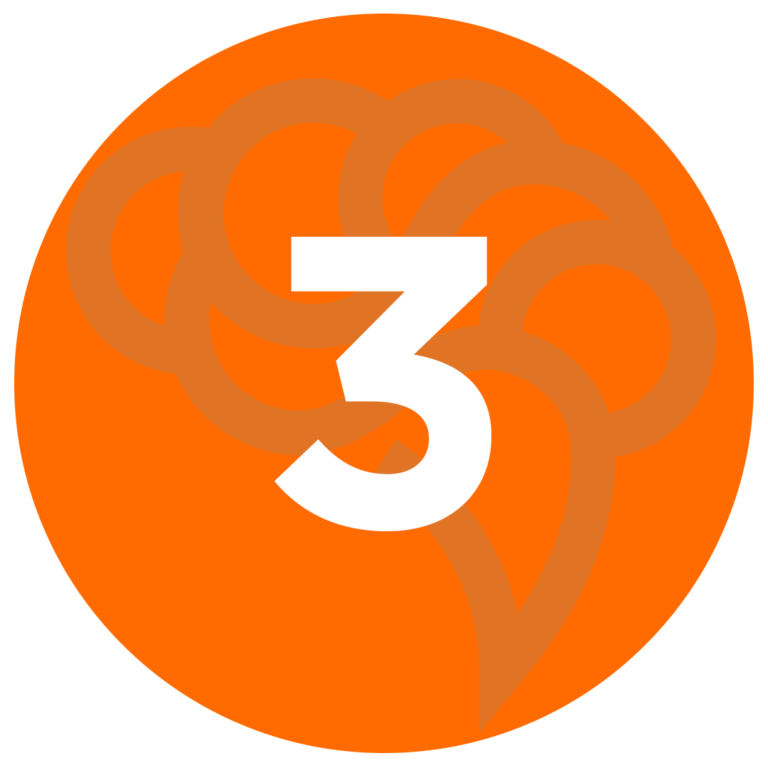
Module #3 Understanding Different Positions In Different R&D Departments
You know that you want to transition into a rewarding R&D position where you can stay in close proximity to cutting-edge research and innovation, but you are not familiar with the dozens of positions available to you in R&D. To help you evaluate your options and target your job search, this module explores…
- The main aspects you should consider when evaluating what is the best industry position for you based on your desired professional lifestyle. You will also learn how to evaluate company culture to determine if a given company is the right fit for you.
- You will be able to explore popular R&D positions and how they are different from each other so you can establish the best fit for you and target your job search accordingly.
- You will also be able to explore different sectors of R&D based on the products, services, formulations, features, technologies, drugs or treatments you want to support.
- You will understand how projects are managed at top companies too. Project management plays a significant role in ensuring that a company achieves its R&D goals. You already have project management skills whether you know it or not. Here, you’ll learn how to communicate your current project management skills using the language of industry, including language related to budgeting, documentation and project milestones.
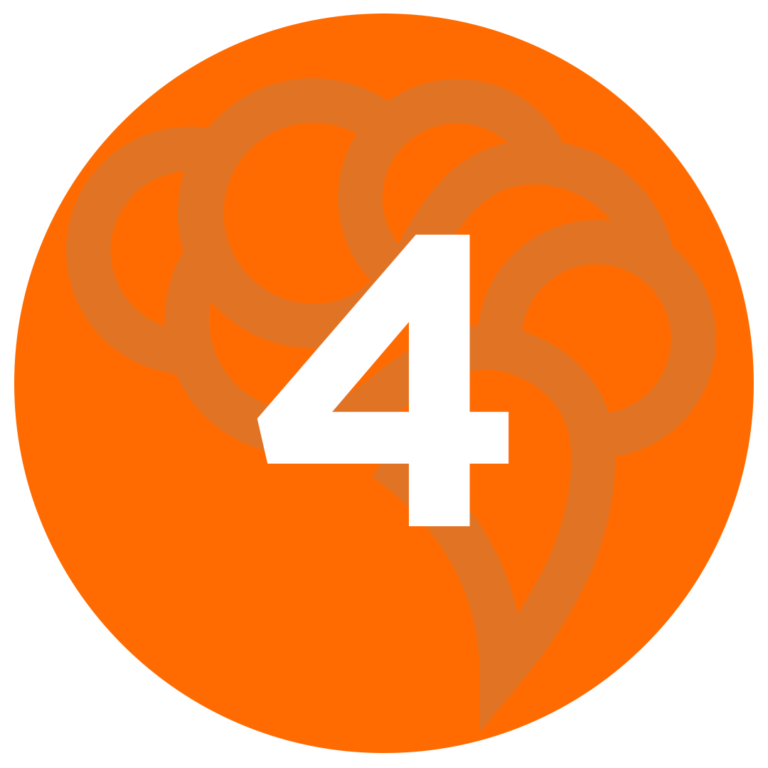
Module #4 Creating A Successful Job Search Strategy
This module is all about organizing and prioritizing your job search so you can execute the job search process quickly and effectively. You’ll discover…
- The main factors you need to consider when setting up a job search strategy to ensure you get the best results for the time you invest.
- The two types of event networking activities you should engage in and how one type of networking activity can help you bypass competition to make a positive impression with company professionals.
- What you need to know about recruiters and how you can leverage contract-to-hire positions. Even if you haven’t considered a staffing solution, this module explains the benefits of this option for getting your foot in the door of your future company.
- How to craft a resume that increases the chances a company will read it as well as how to create resumes that are tailored for specific R&D position. This module will detail the ingredients of writing strong bullet point for resume, as well as how to adapt these bullet points for your LinkedIn profile to show continuity between your resume and LinkedIn profile.
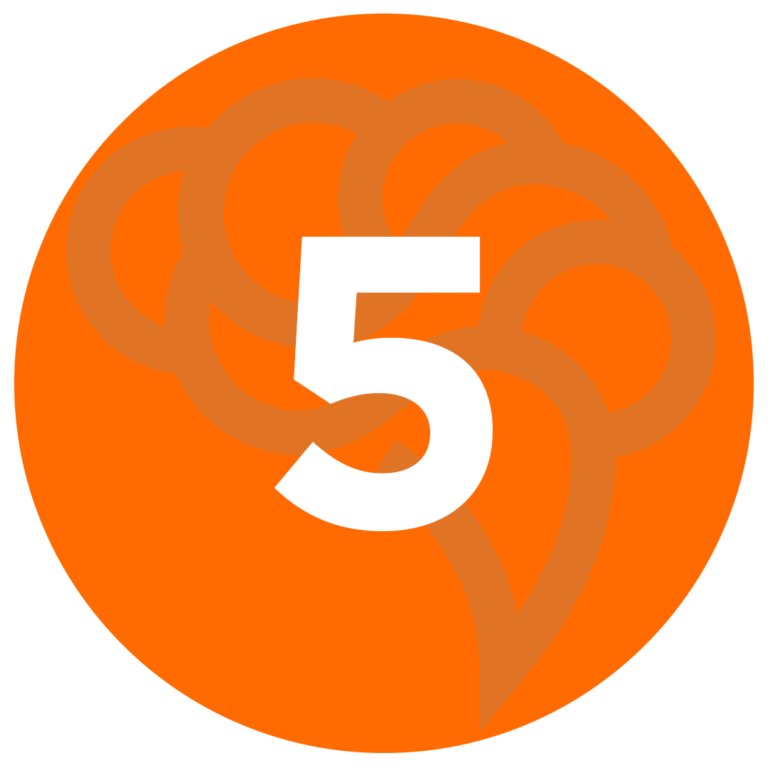
Module #5 The Interview Process For R&D Positions
If you’re wondering how R&D companies choose candidates, then this module will help you understand the typical process. This module covers…
- The process you can expect once a hiring manager reaches out to you for an interview. Know what the hiring manager is attempting to discover and what you should NEVER discuss with these managers during the phone call.
- The unexpected questions a hiring manager may ask you and how you can effectively navigate this scenario. This module will explain some queries that may catch you by surprise so you can start preparing now.
- What a typical site visit looks like and what skills and behaviors a company evaluate you on. Know what situations to avoid, what questions to ask, and what to do in difficult situations. This module helps you enter an R&D company site prepared and ready to take on new challenges.
- Get the facts on how your industry presentation will differ from the presentations you’ve given in academia. You’ll understand everything from how to make a good first impression to the details you need to include in your slides. Discover what a research and development company is thinking during your interview so you answer critical questions in the best way.
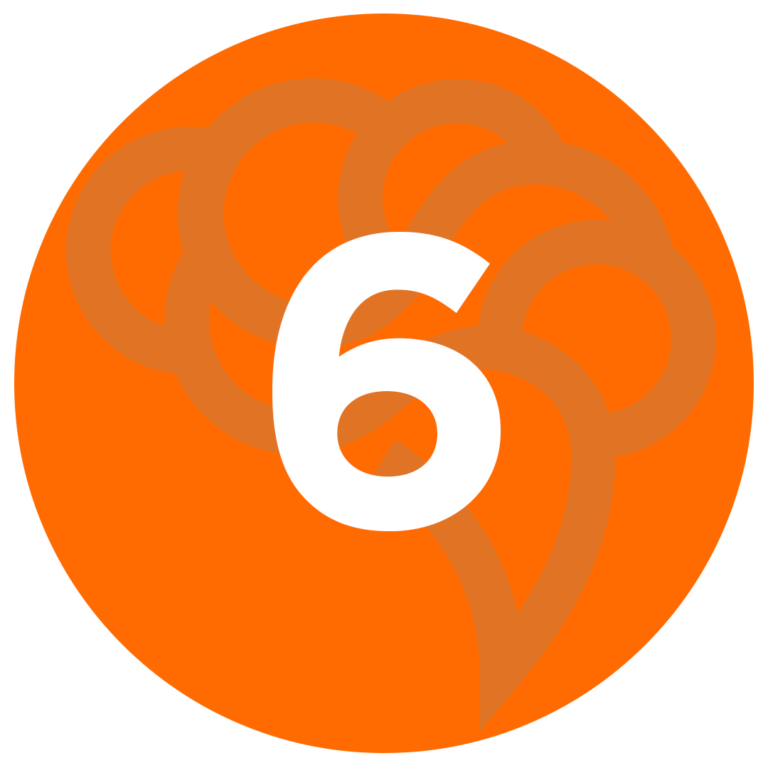
Module #6 Onboarding & Career Progression
Landing an R&D position is only the beginning of a new chapter in your career. Enter the industry with a forward-thinking mindset. This module covers…
- The first 90 days of your new R&D career, including how to navigate this “probationary” period in your contract. This module explains what to expect and how to behave during your first few months on the job to set yourself on a trajectory for long-term career success, as well as the importance of a successful onboarding process for employee retention and satisfaction.
- Options for career progression. Your industry career is not set on stone, it continues to evolve as you grow professionally. This module explains the opportunities you have for career growth so you can plan your next steps.
- The company ladder you would climb in a larger company as well as what positions you could seek in a smaller company. There’s a difference between startups, smaller companies, and giant players in the R&D space, and this module will help you distinguish between the three.
- What positions you can get promoted into next—should you ever desire a different role at the same company, or at a different company. Your research position can open many opportunities, and this module will help you understand other jobs available to you.
As Soon As You Join The R&D Society, You Will Also Get Immediate Access To The Following…
A crash course that reveals an insider’s perspective on what it’s like to work as an R&D professional so you know what niche to pursue, what you could expect in a normal day, and where career opportunities are available.
- The R&D Society will help you understand what you could expect in a typical day, how you should interact with coworkers, and what your tasks and responsibilities would be based on your position.
- You’ll get information that quickly clarifies which niche is best given your background and interests—whether that’s working at a large biotechnology, technology, or pharmaceutical company, or a small startup, including niches available to you in other sectors such as tourism or gaming.
- You’ll gain insight into the work environment, what to expect when it comes to attending conferences and meetings, and other details that will help you transition from your current mindset to the mindset of a top R&D professional.
Critical information for those make-or-break moments you’ll encounter in your job search so you don’t make a mistake that lowers your chances of securing a job.
- You’ll understand critical job search etiquette to help you transition from the current social norms you’re following to new professional behaviors that will showcase you as a top R&D professional. You will also gain an understanding of which pitfalls to avoid during the interview process.
- You’ll see why your current networking routine may be harming your job search and what you need to change to increase your chances of gaining referrals.
- You’ll know the critical angles and approaches you should take during your job search to ace your first or next phone screen, including how to successfully interact with the hiring manager, how to portray your professionalism during a video interview, and how to use the on-site visit to your best advantage.
Access to an intimate, private community support group where you can ask other members questions and enjoy their feedback. This group is full of conversations focused around goals, experiences, and advice specific to your job search.
- Connect with R&D professionals and aspiring R&D professionals who’ve landed industry jobs. Ask for their feedback on which positions are rising, which companies are promising, who’s hiring, and what industry trends to expect.
- Connect with other members to share tips, ideas, and experiences. Those in your group are those interested in R&D jobs, which means you have an instant community of PhDs with similar career aspirations.
A step-by-step plan that covers the entire hiring process. This program will remove the guesswork so you can tailor your efforts for the right R&D position for you.
- Over the course of 6 modules, each containing workbooks, slides, transcripts, quizzes, and videos, you’ll understand the process you need to follow to successfully apply and get hired at top R&D companies. Each module builds on the previous one and guides you through your job search step by step.
- Gain detailed information on creating a targeted resume and a presentation that takes you one step closer to a job offer. The R&D Society helps you avoid the pitfalls associated with marketing your skills to potential employers as well as success strategies you can employ.
- Explore all the career options available in the R&D field. The R&D Society will inform you on the most on-demand R&D positions that shape the landscape of R&D in several industries. You’ll also understand which career paths you can take once you secure your first position.
A variety of tools to cement your learning and help you put each module into action so you can help ensure you get hired into an incredible R&D career.
- When you join the R&D Society, you’ll gain instant access to the complete R&D Society materials, including mentorship videos with closed captioning, accompanying workbooks, slides transcripts, and R&D resume templates.
- You’ll also gain access to quizzes that will help you retain the knowledge you’ve gained, and access to the community support group and Member Directory of over 16,000 members.
To Stack The Odds Of Getting Hired In Your Favor, You’ll Need….
- Inside information from R&D professionals currently working in top corporate careers – the kind of professionals who are in the R&D Society.
- Knowledge of how to get job referrals from R&D professionals – job referrals that lead to interviews and job offers.
- Translate your current presentation abilities into a presentation that is relevant to company leaders, showcases your skills, and informs decisions.
- Understand the difference between R&D positions across industries so you can establish the best fit.
- Create a resume or CV that avoids losing the attention of R&D employers.
- Cultivate knowledge to successfully interact with employers during phone conversations.
- Articulate your interest in a company at critical moments during the interview process.
- Give the right answers to important questions during your site visit.
- Learn how to reveal your personality in a way that shows you are able to work both autonomously and with a team.
- Express yourself in a way that aligns with a company’s goals.
- Showcase your collaboration abilities, problem-solving expertise, and other transferable skills.
- Ace the behavioral questions that R&D employers will ask you.
- “Wow” the audience with your interview presentation during your site visit.
The Goal Of Research Is Different.
According to the National Science Foundation, academia receives 56% of the funds devoted to basic research. In contrast, companies only receive 22% of the funds for basic research, but they claim 61% of the funds for applied research and 87% of the funds for development.
The point is clear—in academia, your efforts are centered around advancing knowledge, but at a company, your efforts are focused on developing a product or treatment that will benefit the consumers or patients.
Importantly, if you do not have a strong understanding of development (that’s the “D” in R&D) or commercialization, then you’re in trouble. This R&D Society will help.
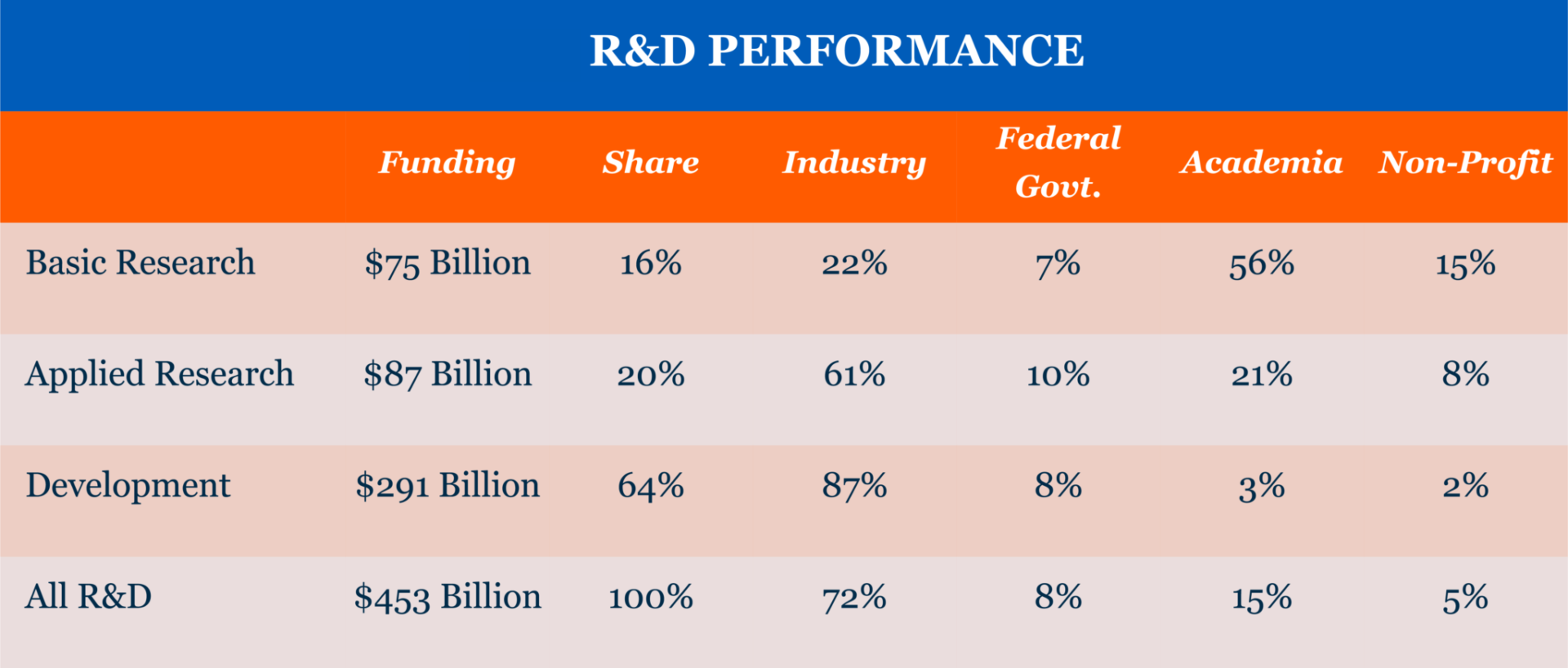
- The work atmosphere is different. When you were completing your degree engaging in academic research, you were likely working with limited funding and vague milestones that had to change. You also had a lot of time to explore things by yourself, for better for for worse, because you were creating knowledge for the sake of knowledge that might help someone directly decades later. In industry, company objectives are set by teams and you’ll work closely with a professional team to hit very clear goals to produce products, services, tech, drugs, formulations or treatments that will help humanity in this lifetime.
- The communication expectations are different in a corporate environment. You will be required to concentrate on your strategic tasks. You’ll also be required to elevate your communication skills so you can discuss key results with executives, investors and other stakeholders that don’t have your expertise. Just as importantly, your future employer isn’t primarily looking at your publication record. They want to know how you’ll mesh with the company culture, how well you can collaborate, and what other transferable skills you have.
Knowing The Differences Between Academic Research And Corporate Research Will Help You Get Hired
Understand The Fundamental Differences...

Understand The Work Environment Difference...
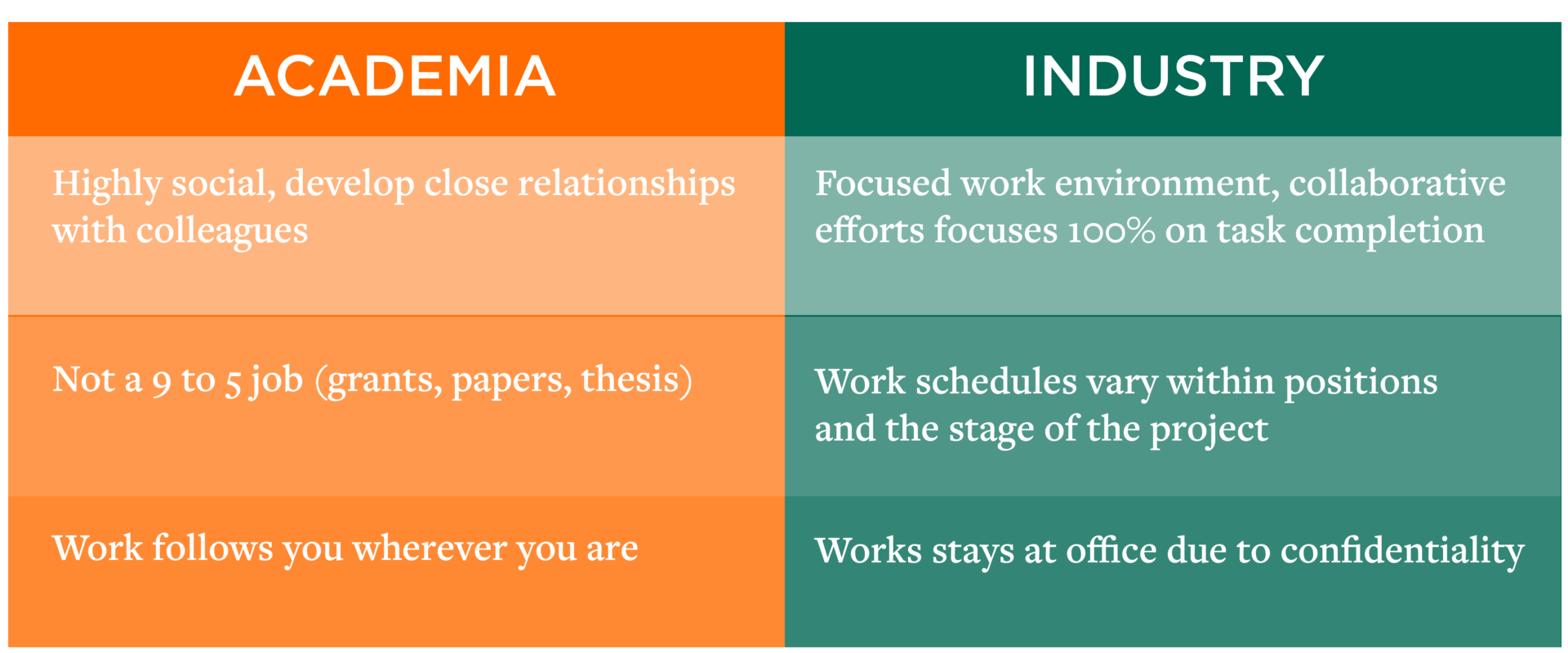
Meet The R&D Professionals At Top Companies Who Helped Develop The R&D Society Material

Klodjan Stafa, PhD
Associate Director at Estee Lauder Companies

Nathalie Fiaschi, PhD
Senior Director of Oncology and Angiogenesis at Regenron

Natalie C. Fredette, PhD
Scientist at BioMarin Pharmaceutical Inc.

Desyree Jesus, PhD
Associate Director at GeneFab

Evan Dubiel, PhD
Group Leader at PPD

Lilian Josephson, PhD
Principal Chemist at Ecolab

Nikolett Biel, Ph.D.
Pharmacology & Toxicology Reviewer at the FDA

Arunodoy Sur, PhD
Technology Licensing Officer at Nova

Ravikiran Ravulapalli, PhD
Scientist at Sanofi Pasteur

Robyn Marty-Roix, PhD
Principal Medical Writer at Boston Scientific

Sunayana B. Banerjee, PhD
Senior Medical Science Liaison at Jazz Pharmaceuticals
We understand that you know what you want—an R&D position where you’re directly involved in moving research forward in a big way.
But we also know what you need to get there—a targeted approach that’s tailored for someone with your research background and unique goals.
To put it another way…
You’re convinced you want to leave academia.
You’re convinced you want to enter into at top R&D position at a top company.
But you’re also convinced about something else—you want to develop breakthrough technologies and be at the forefront of innovation.
It’s our goal to help you do just that.
The R&D Career Track Includes Quizzes To Test Your Knowledge To Ensure You Know How To Leverage The Skills You Already Have To Get Hired Into The Right Role For You
You will receive a ribbon from our R&D team upon completion of the program along with access to any upgrades to materials such as the upcoming 4th edition including new modules. We’re always improving the online program and you’ll get access to every R&D Society update.
The R&D Society was created by and is maintained by R&D professionals who know the right questions to ask you to make sure you’re ready to get hired.
As such, each module includes a quiz to test your knowledge and by passing the quiz, you’ll know you’re ready to get hired as an R&D professional.

“The R&D Society helped me organize my job search and provided extra accountability to create individualized milestones and made sure I followed through.”
Our Mission
The goal of the R&D Society is to help you smoothly transition into a highly paid R&D job so you can continue to do what you love most.
We help you achieve this goal by empowering you with world class guidance, resume templates, and community support so you have a clear path to landing your first or next R&D role.
Here’s what makes what we do so special and helpful for securing a top R&D job.
We are a targeted program built by R&D professionals for aspiring R&D professionals.
The result is guidance that is targeted, structured, and personalized for R&D roles.
Since this program was built by practicing research and development professionals, it includes knowledge of what companies are looking for and insights into how to make the best impression possible on these companies
We understand that some R&D positions may be a mystery to you. You may not know what sectors are best for your background, or what interests, or even what you can expect in a typical day.
The R&D Society will make sure you have the insights you need to enter interviews prepared.
The R&D Society’s community support will also help you stay up-to-date on current industry trends.
Unlike academia, in R&D, trends change weekly if not day-to-day. Market developments can quickly create a turn of events and your knowledge of these industry trends will determine not only your success in R&D, but whether or not you get hired in the first place.
As a member of the R&D Society, you’ll enjoy access to other members, many of whom are working at top companies and can provide you with up-to-date information on current industry trends and which trends you should keep an eye on.
Why R&D Holds So Much Opportunity For You
1. Research & Development is a massive part of industry.
According to UNESCO, the world spends $2 TRILLION on R&D every year, and the United States alone spends $581 billion on R&D annually. This is a huge amount of money and this large spend creates many, many opportunities for you in different industries.
2. R&D is always changing and always advancing, and maintaining a culture of innovation was one of the top concerns for R&D employers.
As a researcher you are well suited to help companies maintain and build an innovative culture, and this is something you should communicate when you are talking with potential employers. According to the Innovation Research Interchange, more than 40% of the employers surveyed said that one of their top innovation tactics is to hire new people. They are looking for new, fresh people who can bring innovative ideas to their companies.
3. Companies in all sectors invest heavily in R&D
As researchers, we tend to think that R&D is a subject that only pertains to biotechnology, technology and pharmaceutical companies. Yet, companies in dozens of industries invest heavily on Research & Development. This means that you can find a fulfilling career in R&D no matter your background and whether or not you want to do bench work or manage those doing benchwork.
3 Biggest Advantages Of Working In R&D…
1. Your Progress Is Measured Accurately And Consistently Based On Performance.
In R&D at a top company, your performance on assigned work and shared goals is used to accurately measure your progress. Your performance is also used for determining promotions, salary increases, and bonuses. Not only this, but there are specific people designated for measuring your progress and they are actually held accountable to it.
The important takeaway here is that you know exactly how you are doing at all times. Your goals, your manager’s goals, and the company’s goals are aligned, which helps manage expectations. Don’t underestimate the motivational power of this kind of clarity and feedback.
It’s powerful and it leads to a much happier personal and professional lifestyle.
2. You Are Rewarded For Being A Leader And Showing Initiative.
In R&D, you will work at a very fast work pace and be expected to deliver accurate results quickly. This is a good thing. It’s even enjoyable. Working at a faster pace is enjoyable is because you are working with a team whose goals are aligned with your goals. It’s also enjoyable because you are rewarded for finding better ways of doing things. If you take the initiative to improve the workflow of a system, improve a product, or make any part of the company better—you’re rewarded. The more confidently you take initiative, the more you are rewarded.
This is very difficult for those who have spent a lot of time in academic research to understand. How can initiative be so valuable? How can confidence be valuable? The answer, in short, is—time is money. Not only that—relieving pain is money and boosting team morale is money. The more time you give back to your boss, like by making a particular workflow more efficient, the more you are rewarded. Likewise, the easier you make your boss’s life and the happier you make your team, the more you are rewarded. True leaders are promoted quickly in R&D. This isn’t always the case in academia.
3. You Are Part Of A Supportive And Structured Work Environment.
In R&D, every researcher has their own team, their own team project, and their own individual responsibilities that are aligned with the team’s goals. Everyone is trained to support each other. In fact, the ability to work well independently and as part of a team is the main requirement of getting an R&D job. As such, R&D teams are not only very supportive, they are highly structured.
Overall, there is a clear and defined corporate ladder in R&D. The key to climbing this ladder is to take initiative and show leadership skills whenever possible. This means going out of your way, without being asked, to improve company systems and to relieve your boss and the company in general of tedious work.
By achieving your goals and staying aligned with the company goals, you can move your career forward from your first R&D position to bigger and better roles.
You Can Get Into A Rewarding R&D Position No Matter Your Training Background Or Target Industry
Industries That Rely On R&D Investment
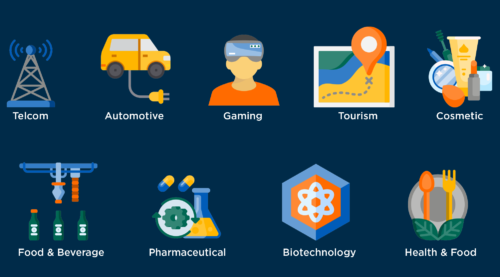
You Can Get Hired Into A Different Research Field. The R&D Society Has A Strong History Of Getting Researchers Hired Into Jobs In Completely Different Disciplines…
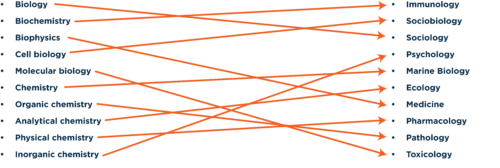
Members We've Worked With Have Secured Positions At Top Companies Like...

Your PhD qualifies you to apply to firms just like these.
But that doesn’t mean they’ll think you’re a good fit for their company.
What you need is information on selecting a company, networking with those in the industry, creating a resume, and effectively communicating during an interview so you prove that you have more than a PhD — you have skills that are an asset to the organization.
The R&D Career Track will give you insider information on how to position yourself as a highly qualified PhD who’s ready to smoothly transition into an industry job.
The R&D Career Track Is An Intimate Group With Structured Support, Which Means Your Program Is Targeted and Personalized
When you join the Association’s Diamond Program, you’re following a program that others have successfully used to transition into industry R&D positions.
The Cheeky Scientist Association has used the R&D Career Track to help other PhDs like you to understand what the interview panel at research and development companies are looking for to help them secure a job.
Now that these PhDs are on the other side of the job search, they’re here to share their experiences with you.
The R&D Career Track Provides Community Support

Connect With Others Who Are Currently Working In Top R&D Positions. The R&D Society Includes Access To A Community Support Group And Member Directory Of Over 16,000 Members.
When you join the R&D Society, you get more than targeted support from R&D professionals who lead the group and instant access to a community of over 1,000 PhDs interested on R&D industry positions or currently working in industry R&D positions.
You’re instantly connected to our community support group, including members already working in top R&D careers. You also get instant access to our entire Member Directory.
Whether you ask questions and request referrals or share tips and celebrate success stories, the R&D Society provides an exclusive space where you can connect with others who know firsthand what you’re going through.
Take a look at some of the community support conversations in the R&D Society below…
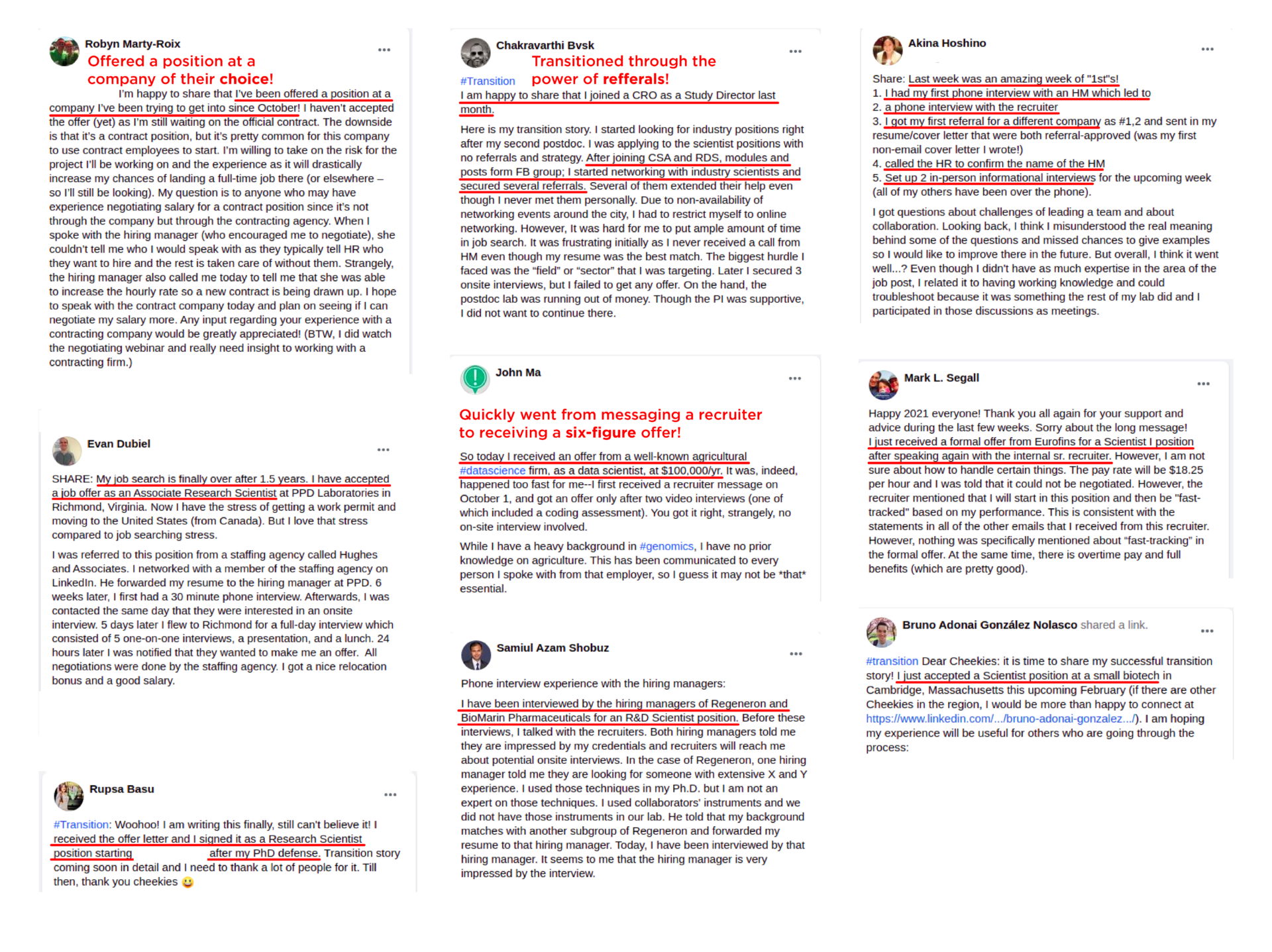

“The R&D Society is a great program for anyone who specifically wants to transition into a research position in any industry sector. ”
3 Reasons Why You Should Join The R&D Society
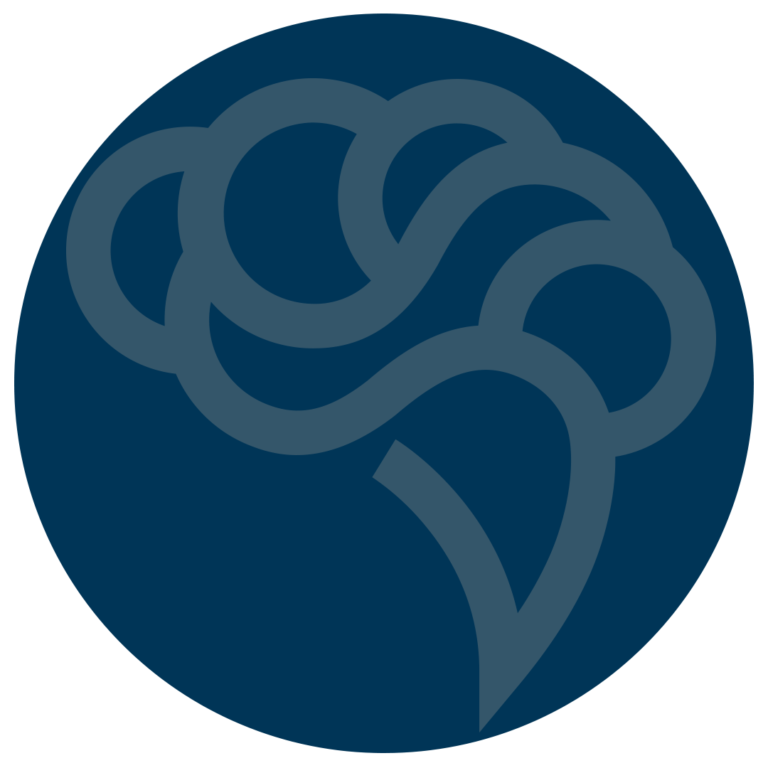
You enjoy research but are struggling in your job search. You already have the research skills you need and know you can learn new ones on your own or through the job search training process. But, you’re not getting many interviews, or you’re not getting any interviews at all. Or, maybe you don’t even know where to start in your job search. Which companies are right for you? How do you craft a resume for R&D positions? Do you include your publications? What about LinkedIn? If you’re asking these questions, the R&D Society is right for you.

The world of R&D is a mystery to you. You’ve only done research in academia and you don’t know what R&D looks like in business. Whether you want to work at a startup or a large corporation; whether you want to work at a biotechnology, technology, pharmaceutical, cosmetic, food and beverage, or other sector, you need to learn how to communicate the skills you already have using the specific language of the company type and sector you want to get into. The R&D Society will help you translate your skills for the right company, sector and specific position for you.

The R&D Society will help you finally translate the knowledge you gained during your years and years of research into products, services, technologies, features, formulations, drugs, or treatments that help people today, in this lifetime. You will finally be able to transition from creating knowledge for the sake of knowledge to having an impact on humanity now, not later. If this is something you want for yourself, then the R&D Society is right for you.

“The insights I got from the R&D Society is amazing. The program has helped me with every step of the job search process and given me tips on resume writing, networking and more, including access to other Research Scientists.”

“Getting into a Research Scientist position in industry is very different from getting into a non-research position. This is why the R&D Society is important: it gives you targeted and personalized help specifically for R&D positions.”
Who The R&D Society Is NOT For…

It’s NOT For People Who Want Private, Real-Time Mentorship Meetings
This is a self-serve mentorship program that includes a variety of online materials that you can go through at your own pace. It does include access to a private group of community support only where you can engage with other members but no advice is promised outside of the community you engage with. We do have a premium coaching service for those interested in private meetings but this program does not offer private mentorship meetings.

It’s NOT For People Who Think This Program Is Their Fairy Godmother (We Do NOT Guarantee A Job)
The R&D Society is a comprehensive guide to getting hired into R&D and includes everything from guidance from those already working at top companies, to resume templates, highly targeted insights on the job market, and community support. But, this program will not write your resume for you. This program does NOT guarantee you a job in any way. Being a member of the R&D Society is a huge advantage over other candidates because of the knowledge and network you get access to, but it’s not magic; it’s not a fairy godmother who will wave a wand get you hired the next day.
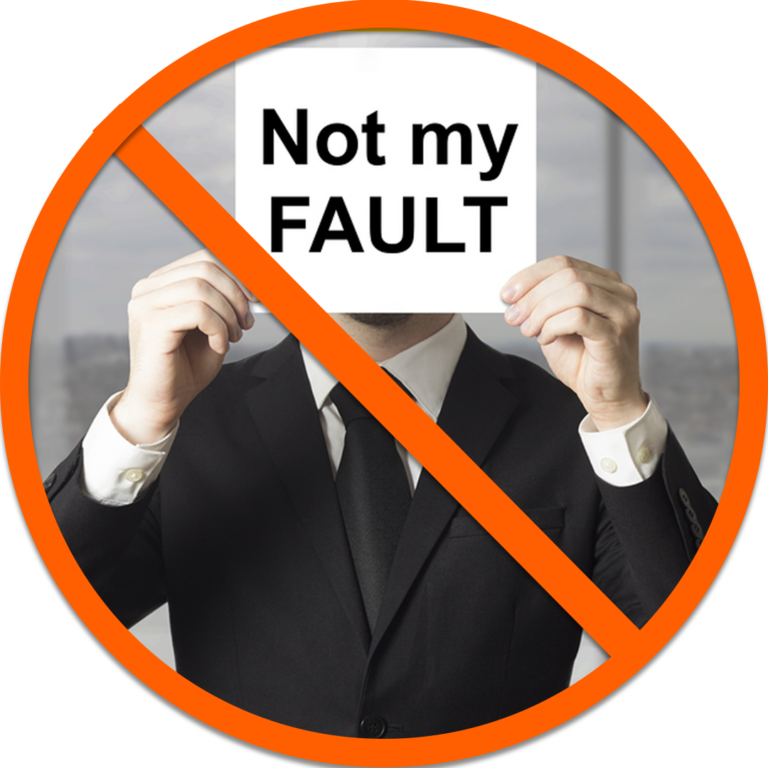
It’s NOT For People Who Avoid Personal Responsibility
The R&D Society includes email reminders and prompts to hold you accountable to working your way through the program. We want to make sure you find the right company and right fit position for you and your background. This means keeping you motivated even when you feel motivated. If you hate getting reminders, insights, tools and check-in messages, then this program is not for you. You can go through the program at your own pace and personalize your settings so you can choose which reminders, if any, to get, but it’s important for you to know there is an accountability aspect of the program.
When It Comes To Getting The R&D Position You Want, Knowledge Is Power
- You know what you want. R&D companies will be looking for some very specific qualities.
- You’ll need to leverage skills you already have but may not realize you developed during your time in academia.
- The R&D Society will get you from where you are now to where you want to be. We’ve done it. We’ve helped thousands of people do it before you. And we can help you do it too.
- The R&D Society is your starting place. It’s time to turn the page and open the next chapter in your life and career.